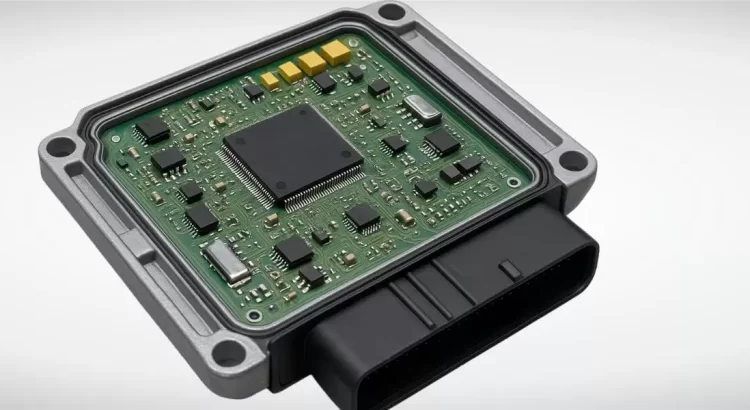The control unit is one of the most important components in a modern car, as it acts as the vehicle’s “brain.”
In short, this component processes data in real time and controls the operation of various systems, from the engine to safety devices. When it has problems, it can affect performance, increase fuel consumption, and even prevent the car from starting.
In this article, learn what a car’s ECU is, how it works, the main symptoms of malfunction, and the advantages of reprogramming.
What Is The Control Unit?
The control unit, also called ECU (Electronic Control Unit), is a small computer installed in the vehicle.
It receives information from dozens of sensors, such as temperature, pressure, engine speed, and throttle position, and uses this data to adjust the car’s performance in milliseconds.
In newer models, there are several control units, each with a specific function. However, the best known is the engine control unit (ECM), which is responsible for managing the entire combustion process.
What Are The 5 Functions Of A Control Unit?
The main functions of the ECU is to ensure that the engine runs with maximum efficiency and safety. This includes:
- Regulating the air and fuel mixture;
- Adjusting the ignition timing;
- Controlling turbo pressure;
- Monitoring pollutant emissions;
- Integrating systems such as ABS and gearbox management.
If the control unit is not working properly, the vehicle may lose power, consume more fuel, and fail to comply with emission standards.
How Does The Car’s ECU Work?
The ECU receives data from the sensors and processes it to send commands to the actuators (e.g., injection, ignition, or turbo).
All this happens hundreds of times per second, ensuring that the engine runs as smoothly as possible.
Do All Cars Have An ECU?
Almost all cars manufactured since the 1990s have at least one ECU.
Older models used mechanical or electromechanical systems to manage the engine.

How Many Control Units Does A Car Have?
A modern car can have several dozen control units. In addition to the engine ECU, there are units for:
- Gearbox;
- Airbags;
- ABS and ESP;
- Air conditioning;
- Comfort systems;
- Driver assistance systems.
All of them are interconnected and communicate via the CAN network.
How To Tell If The Control Unit Has Burned Out?
In more serious cases, this component may burn out. Among the most common symptoms of a burned-out control unit are:
- Difficulty or inability to start the engine;
- Irregular operation (engine stuttering);
- Malfunction light on the dashboard constantly on;
- Unexplained electrical failures.
Is It Possible To Drive With A Faulty Engine Control Unit?
In minor faults, the engine control unit enters emergency mode to allow short trips to the auto repair shop.
In serious cases, the vehicle may not start or may suddenly stop, making driving dangerous.
To resolve some of these faults, the solution is to reprogram the control unit.
What Is ECU Reprogramming?
ECU reprogramming consists of changing the original parameters set by the manufacturer to adapt the vehicle to new requirements.
This reprogramming is done with specialized software that reads and writes the ECU’s operating maps.
The objectives may vary, but the most common are:
- Improving performance (gaining power and torque in the engine);
- Reducing fuel consumption under certain conditions;
- Adapting the vehicle to mechanical modifications (e.g., new exhaust system or larger turbo).
What Parameters Can Be Changed When Reprogramming Control Units?
When reprogramming a control unit, it is possible to change:
- Engine temperature;
- Throttle response;
- Engine speed in each situation;
- Automatic transmission operation.
What Are The Advantages Of Reprogramming ECUs?
In summary, the advantages of reprogramming this component are:
1. Lower Fuel Consumption
Factory-spec ECUs may not have fuel consumption as well optimized as a reprogrammed ECU.
Reprogramming can, for example, delay turbo activation to save fuel.
2. Adapt Driving Style
Reprogramming the electronic control unit allows the vehicle to be tailored to any driving style.
For example, a driver with a smoother driving style can tailor the car to respond in the same way.
What Are The Disadvantages Of Reprogramming Control Units?
On the other hand, it is necessary to take into account that reprogramming control units has the following disadvantages:
1. Loss Of Warranty
By reprogramming the electronic control unit, the vehicle owner is putting the car’s warranty at risk, unless this process is carried out at a workshop authorized by the car manufacturer.
2. Legal Issues
Inspection centers can easily detect ECU reprogramming.
Therefore, you must notify the inspection center authority, otherwise the vehicle may fail the inspection.
3. Increased Fuel Consumption
If the driver wants more power from a reprogrammed ECU, the vehicle will most likely consume more fuel.
4. Reduction In Engine Lifespan
Car manufacturers set the specifications in the ECU, as they believe this will increase the vehicle’s longevity.
If this is changed during reprogramming, you may be reducing the vehicle’s lifespan.
How Much Does A New ECU Cost?
The price of a new ECU can vary between hundreds and thousands of euros, depending on the brand, model, and features.
High-end cars or those with the latest technology tend to have higher costs.
Want to know more about the automotive world? Then follow us on Facebook and keep up with all the content we share daily.



